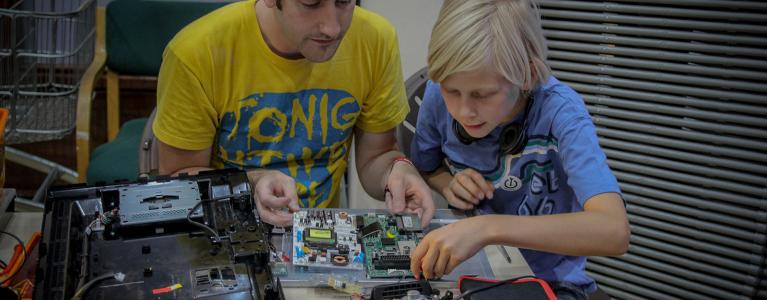
Doug Simpson from City Hall’s Environment team introduces the ‘circular economy’. He tells us why it's a concept we'll all be familiar with soon...
I’ve worked in City Hall’s Environment team since 2006 – I’m expecting a gold pen in August for 10 years’ service. During this time I’ve worked with local authorities and business to help them reduce waste and recycle more. Essentially doing the best possible within the ‘take-make-dispose economy that until now the world has thrived on. In recent months my focus has shifted to understanding different business models that by design de-couple and eliminate waste production from consumption and transition London to a Circular Economy. If you’ve not heard about it yet, it’s something you’ll soon be hearing a lot more about.
Known to some as the ‘sharing economy’, the Circular Economy represents a shift in how we consume goods, experiences and services. Ultimately it’s about giving people more choice and using resources more efficiently. Think for a second, if it was easy and affordable to share, rent or lease everything that you own and move it on to its next user instead of buying and having to dispose of afterwards. This is of course already happening: we donate, we share and rent our homes, we rent storage space on the cloud, we lease cars we could never afford to own then upgrade for a better one a year later.
But what else could be ‘serviced’ in your house or flat? Do we really need to own mobile phones, tablets, in fact any electronic device or product? I can’t say I’ll be heart broken when it’s time to sell my washing machine. Let me lease and pay by the wash instead. A circular economy has reuse, refurbishment and remanufacture at its core providing high quality experiences whilst using less of the earth’s resources (metals, oil, trees etc). It reduces the impact our purchases and habits have on the environment. It’s good for the planet. It’s good for our pockets too, as we don’t have to keep using and paying for raw materials to create products.
This year, I’m working with five small businesses to help them grow using circular economy business models. These businesses are in five of our target sectors - food, electronics, textiles, built environment and packaging. They include sustainable fashion company Clotho who triumphed in the Mayor’s Low Carbon Entrepreneur competition last year. Their business is going from strength to strength. To date they’ve reused 10,000 items of clothing. I’ll be working with them to help ensure their textiles are recycled in the most environmentally way possible. I’ll also be helping them to measure and report on the business’s social impact as well and look at sustainable packaging options.
Another is Globechain, an online platform that connects business to charities, small enterprises and individuals. It offers a service to give and take unwanted items within the supply chain providing social impact audits. Listed items like fixtures, retail stock, medical beds and kitchen units (to name a few) can be seen and reserved by other members to collect. I’ll be helping Globechain link into business networks so this reuse of items spreads through the city.
The Restart Project is a social enterprise which encourages people to repair their broken electronics to extend their lifespan and prevent electronic waste. It hosts Restart Parties in London where you can bring your gadgets and find out how to fix them together with their repair coaches. These events have prevented over 43 tonnes of carbon dioxide in London alone. As Restart's network is growing internationally, I'll be helping them connect with manufacturers and other companies who can benefit from their approach.
Snact make snacks from fruit and veg that would otherwise be thrown away for being too big, too small, too ugly, or simply too abundant. It turns these unwanted foods into healthy snacks that contribute to one of your five a day. I want to help Snact connect with the food industry to help grow London’s surplus food market, and help them source super sustainable packaging.
Unpackaged Innovation Ltd. promotes reuse within the retail grocery sector. Unpackaged allows you to take your own packaging to your favourite shop or supermarket to refill, reducing packaging waste & associated carbon emissions. They are currently trialling a partnership with Planet Organic and working on research projects to promote reusable systems throughout the supply chain. I’ll be helping them link into other supermarkets and to share their experiences across the grocery sector.
If you think you can help any of these businesses or want to know more about the Circular Economy please get in touch.